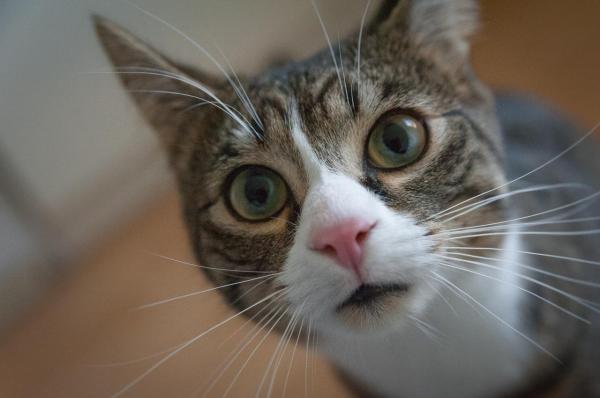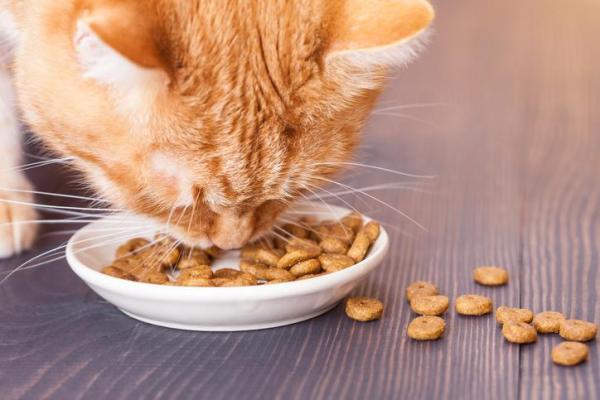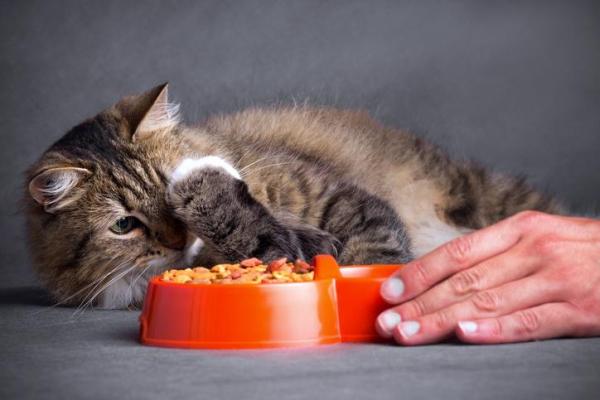
We all know how annoying persistent hiccups can be. We may have heard many old wives tales about how to cure them, but it might not be as easy to make your cat drink from the other side of their bowl. They can be frustrating, but it's important to know they are not very common in cats.
The first thing you should do if you see your cat has hiccups is nothing. Felines will usually recover quickly enough of their own accord. Their bodies will usually take care of it themselves and you will have no need to intervene. However, if the hiccuping is prolonged and start to intensify, then we may need to help them control the situation. You may even notice other symptoms which might suggest something is wrong. AnimalWised helps you to know how to get rid of cat hiccups, not only so you can ease their frustration, but also to see if there might be some other issue. If you think this may be the case, don't hesitate to take them to the vet.
Why does my cat have hiccups?
The short respiratory sound of the hiccup (sometimes spelled hiccoughs) is the result of two organic phenomena which occur involuntarily in nature. The preliminary part of the hiccup happens due to an involuntary movement of the diaphragm. This sudden, intermittent contraction generates a temporary closure of the epiglottis. The result is the characteristic ‘hip’ sound once it leaves the mouth. A very similar process occurs
Although attacks of hiccups can seem to appear at random without a specific cause, there are some behaviors or conditions which can lead to their development. For cats, the most frequent causes of hiccups include:
- Eating or drinking too quickly.
- Binge eating or excessive consumption of food.
- Formation of hairballs in the gastrointestinal tract.
- Allergic reactions.
- Hyperactivity, anxiety, stress or excessive excitement.
- Metabolic disorders (such as hyperthyroidism) leading to stress or hyperactivity.
- Exposure to cold can promote the involuntary contraction of the diaphragm, causing hiccups in cats.
Hiccuping in cats and eating are often closely related. If you feel this may be the case for your cat, ensure to observe them while eating to see if they are eating normally.

What to do if my cat has hiccups?
As we have mentioned, hiccups in cats are usually harmless and last only a few seconds. This is because cats are generally well disposed to naturally ridding themselves of them. This is why is is usually best not to intervene and let them cope on their own.
If we find that it takes too long for the cat to recover and their hiccups return frequently, the ideal thing is to go to the veterinary clinic. Occasionally, a cat owner might mistake the sound of a cat having something stuck in their throat for that of hiccups or even sneezing. If this is the case, it can be potentially life threatening. If you don't know what you are doing, you must take them to the vet in case you do more harm when you're trying to help.
However, it is essential that all cat owners adopt some preventative measures to ensure their pet doesn't have a hiccup attack in the first place. Below we will summarize some of these measures.
Tips to prevent hiccups in cats
- Eating and drinking at normal speed: although it is perhaps more frequent for dogs to eat too quickly, this doesn't mean cats are immune. As it is a major cause of hiccups in cats, there are ways to slow down a speedy feline. Place their food and water in bowls with high sides. They still should be able to eat and drink, but not so fast. It is also important to establish a regular routine in terms of sustenance. Prolonged periods of fasting can make them insecure and eat quickly as they think they might not be getting more food in the future.
- Prevent hairballs: although hiccuping in itself it harmless, it may be linked to something like the accumulation of hairballs which build up in the gastrointestinal tract. This can, in turn, lead to vomiting, constipation and other digestive issues. It is essential cats expel hairballs from their body. If you see they might be struggling, catnip can help purge them. Also, regular brushing should help prevent the formation of hairballs in the first place.
- Remove possible allergens: your cats hiccups may be due to a possible allergic reaction, especially if they are in conjunction with sneezes. You will need to take your cat to the vet so that they can run tests and find out what causes their allergic reactions. Once you find out the culprit for your cat, you can remove the allergens and hopefully reduce the chance of hiccups.
- Be careful of cold: cats are sensitive to the cold and low temperatures can seriously harm their health, potentially leading to hypothermia. If this occurs, hiccups may present themselves as a symptom. Ensure your cat is always protected from the cold, especially when we are not home.
- Preventative medicine: ensuring your cat has all of their appropriate vaccinations, follow their deworming schedule and are provided with regular check ups is very important. Allergies and metabolic disorders can lead to hiccuping, so it is essential to provide the right preventative measures.

Hiccups in kittens or newborns
As with adults, baby cats or kittens can get the hiccups. However, they are often prone to it due to the way in which they are fed. Breastfeeding from the mother can result in a lot of milk going down quickly and getting hiccups. Also, when they are weaning off milk and onto solids, the new way of eating can cause indigestion and hiccups. If you have an orphaned kitten which needs to be bottle fed, it is very important not to squeeze the bottle and force liquid into the cat's mouth. This might not only cause hiccups, but also be very dangerous to their health. If you are sure a kitten's hiccups are not from indigestion, yet they persist, you should take them for a checkup.

How to not get rid of a cat's hiccups
Some of the traditional ‘cures’ for hiccups include scaring someone so that they are frightened out of their hiccups. You should not do this to a cat. They will not understand you are trying to help them and can lead to stress and affect the bond between you.
Other remedies such as drinking out of the other side of a glass will not work for a cat as you can't force them to do this. Spinning them around or trying to distract them, again, may simply cause undue stress. You can't force them to do something they don't want to do without causing unnecessary harm.
This article is purely informative. AnimalWised does not have the authority to prescribe any veterinary treatment or create a diagnosis. We invite you to take your pet to the veterinarian if they are suffering from any condition or pain.
If you want to read similar articles to How to Get Rid of Cat Hiccups, we recommend you visit our Other health problems category.